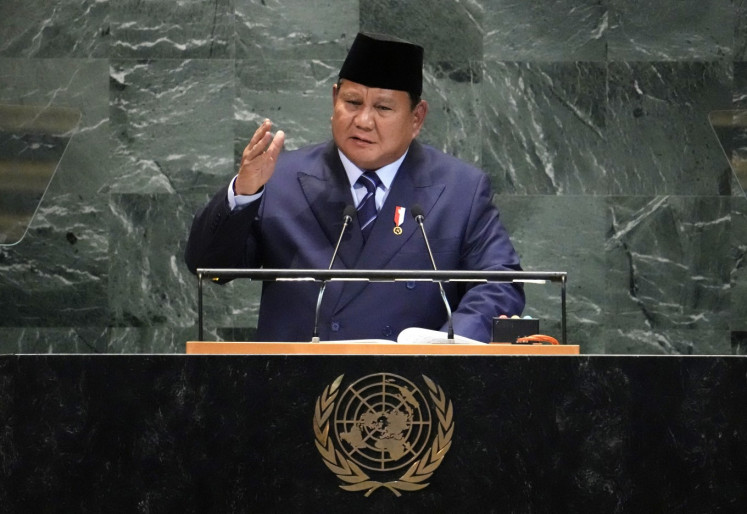Popular Reads
Top Results
Can't find what you're looking for?
View all search resultsPopular Reads
Top Results
Can't find what you're looking for?
View all search resultsSofjan Wanandi: Between family, friends the nation
JP/P
Change text size
Gift Premium Articles
to Anyone
J
a href="http://">JP/P.J. LeoPaulus, the youngest son of Sofjan Wanandi, writes in a book dedicated to his father’s birthday, which falls today: “Dad, after your 70th birthday, we want you to start reducing your activities in politics and business.
“You should focus more on your health and enjoy your life. You cannot change everything on your own and cannot satisfy everyone. Your family needs you, and so do your grandchildren,” Paulus goes on.
His remarks are in stark contrast to those raised by fellow businessmen, friends and even individuals of different political convictions.
Take for example this statement from a former Cabinet minister: “I hope Sofjan remains healthy and enthusiastic enough to correct [government’s] policies.”
Or the following remark from a retired general: “Sofjan should remain consistent, but maintain courage, sincerity and honesty in his struggle for a better Indonesia.”
“I hope he will not change his stance and attitude, and will continue to fight for anything he considers right,” says a retired foreign diplomat.
Meanwhile, a senior lawyer and rights activist expects more from him: “I hope Sofjan will one day write a memoir about the critical years of 1965/1966 as he did play a big role in the transition period.”
All of the above statements may differ in scope, but remain similar in essence as they all ask Sofjan to continue with his life work. And above all, they highlight Sofjan’s true character.
While a poet might need a thousand words to express his mind and figure out the character of a person, a few words from friends or relatives are perhaps more than enough to draw a complete picture of the same person.
This is basically the idea behind the book: Sofjan Wanandi, aktivis sejati or Sofjan Wanandi, the true activist.
Sofjan’s story is indeed unique and somewhat rare in Indonesia. Born in West Sumatra’s small town of Sawahlunto from parents of Chinese descent, Sofjan has proven himself to be an influential businessman.
Active for years in the Indonesian Chamber Commerce and Industry (Kadin), and currently chairman of the Indonesian Employers Association (Apindo), Sofjan is also considered by many as a spokesman for Chinese Indonesian businessmen thanks to his extraordinary communication skills. These have served him well especially when dealing with the government and businessmen of different groups, including pribumi (indigenous one) and foreign investors.
Testimonies from fellow businessmen, government officials — both local and foreign — as well as trade representatives of foreign countries are telling of Sofjan’s contribution to improving Indonesia’s business environment as well as increase bilateral trade between Indonesia and other countries.
The extracts of statements describing Wanandi — included in Sofjan Wanandi, aktivis sejati — from fellow businessmen, friends and relatives give the book much more credibility than Sofjan could ever have, had he narrated himself his life-long achievements in business.
They exclude testimonies from friends and people Sofjan extended his generosity to, especially those he helped with health and education expenses.
His involvement in politics besides being a successful businessman has also earned him a unique position in Indonesia. Politically active immediately after enrolling at the University of Indonesia in the early 1960s, Sofjan was very much involved in organizing street protests in late 1965, which helped bring founding president Sukarno down and promote then Army General Soeharto to ascendancy and eventually presidency in 1967.
His involvement in domestic politics in the early years of Soeharto’s presidency cannot be separated from his closeness with two personal assistants of Soeharto – Ali Moertopo and Soedjono Hoemardani.
As an assistant of Soedjono Hoemardani, Sofjan learned about Indonesian politics directly from the inner circle of the country’s second president himself. He was also involved in the Centre for Strategic and International Studies (CSIS), which was largely reported as a think tank of the Soeharto government – although its role as a government think tank decreased since the late 1980s in line with the passing of Ali and Soedjono.
Sofjan’s involvement in politics also extended to the House of Representatives, where as a member, he acted as a porte-parole for the university student community in the early years of Soeharto’s presidency. A number of fellow activists of the 1965/1966 were also appointed as House members at the time.
Aside from being part of Soeharto’s political machine, Sofjan was also involved and later active in Golkar. He was one of Jusuf Kalla’s staunchest supporters, the man he was old friends with since the mid 60s, who later became vice president, Golkar Party chairman, and ran for presidency in the 2009 presidential election.
Wanandi and Kalla remain close, despite Kalla not holding any government position.
It is his strong sense of solidarity and friendship that have earned him his reputation as a trustworthy individual, a quality his friends, but also by his “enemies” recognize him for.
Much has been said about Sofjan by his friends and relatives. But Sofjan — at least according to those knowledgeable or concerned with upholding truth in Indonesian history — still owes the general public an account of the transitional period between Sukarno and Soeharto as well as the Soeharto years.
Only then will Sofjan’s contribution to the betterment of country be a complete one.










